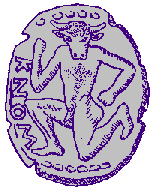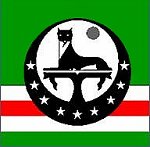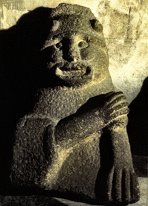
The Chechens and Ingush survive by the skin
of their teeth and the blood of their bones
after 200 years of racist deportation and mass-murder -
and nobody West or East of Russia cares a fig.
CARTE BLANCHE FOR GENOCIDE
Reviews of two books about the continuing genocide in the Chechen-Ingush Republic
by
Oleg Gordievsky

reprinted from THE SUNDAY TELEGRAPH
November 16th, 2003
|
THE OATH:
A SURGEON UNDER FIRE
by Khassan Baiev The war that Russia is conducting against the people of Chechnya has already been in progress for more than nine years (with a two-year break in the middle). This unbelievably harsh, profoundly destructive and completely amoral conflict has led to the virtual genocide of the Chechen nation, the brutalisation of the Russian army and the extraordinary cynicism and corruption of the Russian Establishment. Very little is known in Britain not only about this war but also about the small Islamic Republic of Chechnya and the Chechens in general. Chechnya is situated in the northern foothills of the Great Caucasian Range, beyond which lie the former Soviet Republics of Georgia and Azerbaijan. It is approximately the size of Wales. In the early 19th century Russia virtually annexed Georgia and Azerbaijan, but the peoples on the northern side of the Caucasus stubbornly resisted Russian colonisation. In 1816 Tsar Alexander I dispatched General Yermolov to subdue the region. He built a series of fortresses in Chechnya and unleashed a policy of annihilation. His actions were so ferocious that the next Tsar, Nicholas I, recalled him for his excessive cruelty. But the war against the courageous Chechens - though in somewhat milder form - continued until 1859, when their leader, the great fighter Imam Shamil, surrendered to the Russians. After the October Revolution the Red Army imposed Soviet rule over the entire Caucasus, and Chechnya later suffered greatly from the brutal collectivisation of agriculture. All the mosques were destroyed. In 1944 Stalin accused the Chechens of collaborating with the Nazis in the hope of gaining independence. His secret police appeared without warning, executing the infirm, and shipping off over half a million Chechens in cattle trucks to Siberia and Kazakhstan. Apparently about a third of them died during the transportation. The more liberal regime of Nikita Khrushchev allowed those who had survived to return to their homeland in 1957. The Soviet "Constitution" had defined some national territories as "Union Republics" and others as "Autonomous Republics". The former had the right, on paper, to secede, whereas the latter category did not. In 1991, after the USSR had begun to disintegrate, all the Union Republics became independent states, although some of them - such as Belorussia, Moldovia, Turkmenia and Kirgizia - had never really striven for this. Chechnya, which had the status of an Autonomous Republic, none the less announced that year that it was henceforth "sovereign". A former Soviet Air Force General, Dzhokhar Dudayev, was elected President, and he proclaimed the separation of Chechnya from Russia. Moscow, having just lost huge and very valuable territories and populations in Ukraine and Kazakhstan, decided for "constitutional" - as well as for chauvinistic and strategic - reasons not to allow the Chechens, who had been saying continuously for some 200 years that they did not want to be ruled by Russia, to become an independent country. In December 1994 Boris Yeltsin initiated a war against Chechnya. The following year Russian troops massacred the inhabitants of the towns of Samashki and Bamut. In response, a Chechen military commander, Shamil Basayev, seized hostages in a large hospital on the territory of Russia proper. In April 1996 President Dudaev was killed by Russian military intelligence. The well-known General Lebed persuaded the Russian leadership to conclude a truce with Chechnya, duly signed in August 1996. In August 1999 Basayev, a loose cannon, invaded Daghestan with a group of fighters, supposedly to force Russia to withdraw altogether from the North Caucasus. This provided the grounds for the new Russian Prime Minister, Vladimir Putin, to restart the war against Chechnya just as President Yeltsin was prematurely resigning at the end of that year. Using its overwhelming power, levelling the capital, Grozny, ransacking the country, carrying out "mopping-up operations", killing fighters and civilians indiscriminately, kidnapping men and youths, raping women, setting up concentration camps in Chechnya and in nearby areas, Russia has been conducting this war without a break ever since Putin came to power. And it is still going on today. Khassan Baiev, the author of The Oath, is an outstanding doctor and surgeon. During both these wars he worked continuously in a hospital in Chechnya, operating on the wounded, whether Russian or Chechen. The human losses, especially on the Chechen side, have been so monstrous that Baiev was sometimes on duty in the operating room for 24 or even 36 hours at a stretch. He performed amputations and extracted shell fragments from craniums to the accompaniment of continuous artillery fire, with shells falling on the hospital, power cuts and dwindling or no supplies of essential medicines, appliances and instruments. This is a doctor who knows what war is like from the inside. His descriptions of the atrocities, sufferings and humiliations inflicted on the Chechens make one shudder and weep. There are cases of young men being gagged, trussed up and then dragged along on chains behind armoured personnel carriers; of Chechen prisoners, screaming, being flung out of helicopters by Russians; of a young Chechen girl being raped in front of her father. On January 31, 2000 Russian troops began a total assault on Grozny (for the second time). The doctor tells us how the city was reduced to a wasteland, with thousands of its inhabitants trapped in cellars. Deep penetration missiles and vacuum bombs killed thousands. At this point, the Chechen fighters decided to leave Grozny. At night, in deep snow, 2,000 fighters, several hundred non-combatants and 50 Russian prisoners of war set off through the mine-fields, but because of a violent snowstorm they wandered off the planned route. Someone suggested sending the Russian prisoners ahead, to try to find a safe way through the landmines. Lecha Dudayev, the son of the late President of Chechnya, immediately put a stop to such talk, saying that the death of unarmed Russian soldiers would go against the spirit of Chechnya's struggle for independence and the Muslim faith. The Chechens continued their trek through the minefields, under fire from Russian snipers and tanks, and 170 corpses remained on the snow. It is striking that during all these years Dr Baiev, who carried out hundreds of amputations and was forced to perform brain surgery using a carpenter's hand drill, has been subjected to the crudest insults and threats from both sides in the conflict: from Chechens because he sometimes treated Russian conscripts, and from Russians because he was "providing aid and comfort to the bandits". On several occasions Baiev was in very serious danger of being executed. As a result Baiev was obliged to leave Chechnya. Both in Europe and in America he has spoken publicly about the appalling slaughter in his country. "At my meetings on Capitol Hill,' he writes, "senators and representatives listened politely behind their large mahogany desks, nodding their heads in sympathy. I had the feeling they knew as well as anyone what crimes were taking place in Chechnya, but chose to ignore them. Diplomatic relations between Russia and the USA were improving and no one wanted to jeopardize them". This was written 18 months ago. The slaughter in Chechnya is continuing, and both Americans and Europeans are continuing to ignore it with ever greater shamelessness.
Anna Politkovskaya is a journalist with Novaya Gazeta, one of the few remaining Russian newspapers which are independent of the government. For the last three years she has probably been the only reporter in the world who has regularly shed light on what is really happening in Chechnya (most of the other correspondents who file from there are either intimidated by the Russian security services or have been bought by the authorities). Her international stature, knowledge, experience, beauty and her "presence" have enabled her to pass through all the circles of the hell of the Chechen war and still come out alive and unbowed. Her new book, A Small Corner of Hell, is a brilliant collection of short accounts of what is going on in Chechnya. Politkovskaya is even more frank and forceful in uncovering Russian bestialities in Chechnya than Baiev; she doesn't mince her words. Writing about Russian "mopping up" operations, she tells us about pogroms, arson attacks, marauding, arrests, murders, insults to and humiliation of Chechen women, and outrages against Chechen children. And all this is happening in 2002 and 2003! One chapter is devoted to a single episode, the torture by the Russian military of a young teenager, giving him electric shock treatment and making him stand for hours on end against a wall in the bitter frost. What did these Russian officers want the boy to tell them? Where his Wahhabi brother was. The boy admitted that he wanted above all to be shot as soon as possible, so as to put an end to his agony. Studying the matter closely, the author came to the conclusion that in reality there were hardly any Wahhabis in Chechnya and that the few who lived there were extremely unpopular. Neither was there (or is there) any Islamic fundamentalism, let alone emissaries from al-Qaeda. Many pages of this book are devoted to Akhmed Zakaev, the special representative in Europe of the legitimate government of Chechnya. He is a man with a radiant personality, currently living in London and requesting political asylum in Britain. Moscow pulled out all the stops to have him extradited, slanderously and libellously accusing him of terrorism. In actual fact Zakaev was Chechnya's leading actor, the artistic director of its national theatre, and the Minister of Culture in the Chechen government. As a result of its policy of grovelling and cringing before the Kremlin, the British government kept one of the most outstanding political refugees of the last 200 years waiting for over a year before a magistrate decided last Thursday to grant Zakaev permission to stay here. What is taking place, in Politkovskaya's opinion, is the "unbelievable worldwide betrayal of humanitarian values". Travelling around the world and speaking about Chechnya, most of the time she hears phrases like "the coalition against terror" and "fraternization", but "barely a word about Chechnya". She believes that the USA, the European Union and the European Parliament are doing their best to conceal the truth about Russia's war against Chechnya. The only organisation fighting really
hard against Russian brutality in Chechnya is [the American] Human
Rights Watch. In Politkovskaya's view, the one person in the
world apart from Bush who could help the Chechens is Kofi Annan.
But Annan, she says, is "turning a deaf ear to the situation
in Chechnya". In this book she repeats what she has said in
Boston, Paris, Hamburg and many other places: "Remember,
people are continuing to die in Chechnya every day. Including today."
So far, she hasn't been heard. Perhaps at last, with this book,
we'll hear her now?
|
What Vladimir Putin has done, and continues
to do in Chechenya is worse even than what
Saddam Hussain did to the Marshes and the marsh-people of the Tigris-Euphrates
Delta,
and very much worse than Shevardnadze did in Abkhazia and South Ossetia
- though it is, of course, considerably less than the war-crimes of the
USA
in Japan, South Vietnam, Laos and Cambodia.
Russia, now controlled by an unholy alliance
between the reconstituted KGB
and turbo-capitalism is now widening the conflict to neighbouring Ingushetia
where it is eliminating people through Disappearances in the Chilean style.
Russia is still very much one of the three
Empires of Evil, with China and the USA.
All are getting more powerful, more malignant.
Read more on Chechenya: "Allah's Mountains".
For more information on the Ingush see: John le Carré's thriller OUR GAME (1995)

